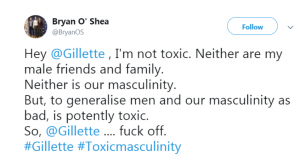What do a feminist protest song and the commercial for a big corporation have in common, and what does it mean for PR and marketing in 2019?
“A Scary Time” is a 2018 feminist protest song and viral video written and performed by Lynzy Lab Stewart. It is based on the comment by United States President Donald Trump that “it’s a very scary time for young men in America”, which he uttered amid the sexual assault allegations against his Supreme Court nominee Brett Kavanaugh. The song contains a list of things that women in the U.S. may be scared of doing. Stewart initially received criticism from conservatives who interpreted the video as attempting to mock men. The song became a viral hit, with over 11.4 million views on Twitter in its first five days[8] and more than 28 million on Facebook in its first two.
”TheBestMenCanBe is Gillette’s controversial new ad which is raising questions about what masculinity means in the so called post #MeToo era. It has already reached more than 27 million views on YouTube, and the reaction is divided. Nearly three times as many viewers have clicked ‘dislike’ (1,3 m) against the video as ‘like’ (739 k) at the time of writing. On Twitter, the video has been viewed more than 18 million times.
The two-minute film, created by Grey New York with social and digital support by Ketchum, is a montage of poor male behaviour that makes way for men challenging their peers to behave more respectfully towards each other and women.
The reaction on Twitter is divided:


What do the two videos have in common?
Stewart’s song is a mocking reaction to a political statement. The Gillette ad is promoting a purposeful rebranding and has sparked outrage from some of their brand consumers. Both deal with the topic of male reputation, or as some call it “toxic masculinity“. It has come about from living in a post #MeToo era, when everything uttered leads to further debate. This certainly doesn’t make things easier in the world of reputation PR. Many PR clients are confused. They are just not sure how to handle the requirements of today’s diversity standards.
Unpacking the Gillette commercial
I think there are two important questions which might help to understand and cope with this challenge. First of all: is it OK for corporations to utilise a current debate, in this case to climb onboard the #MeToo bandwagon, instead of “minding their own business”? The memory of angry Nike customers burning their shoes after the Colin Kaepernik ad might lead you to think that as a corporation it is better stay out of politics. This kind of operation has since been rebranded as “wokewashing”
Yes, it is OK – because in the end isn’t everything about politics? There isn’t a single commercial ad which you could think of being free of politics. Every medium delivers certain standards of society and mirrors our society – in one way or another.
Any man that is not attempting to treat others in a more positive or effective way is letting the side down from my personal perspective
Stewart Rogers, analyst at large at VentureBeat, the leading source for latest technology news, and managing editor at Grit daily: “This isn’t the first time that a brand has used controversy or used popular culture to support its advertising and sales. People may or may not remember Benetton’s famous shockvertising campaign back in the 70s and 80s where it would take everything from HIV through to politicians kissing and use that to promote its business instead of promoting its actual products and services. That was incredible successful for Benetton these days. It has proven to be successful recently for Nike with the Colin Kaepernick Campaign. This will undoubtedly be successful for Gillette despite the negative reactions which frankly bemuse me: Any man that is not attempting to treat others in a more positive or effective way is letting the side down from my personal perspective”.
Second question: is it really totally ridiculous and beyond utterance that a boy might be scared of belonging to the gender which is associated with a so-called “toxic masculinity”? Is it right to blame every boy/man who doesn’t like the Gilette ad because he then views or recognises himself as a bully or aggressor? I don’t think this is right. I personally think the ad is an outstanding masterpiece of storytelling. But I totally understand people who do not feel comfortable with it – regardless of their gender and regardless of their motivation.
Where reputation management comes in
Coming back to what good PR and reputation management requires today and to decide whether an ad is a burner or a f* up. The question is not whether Gilette totally ruined its reputation with this ad or if this was a clever strategic step, because there is no such thing as bad PR. Because we don’t know. We can’t know yet. Today, to understand whether we are on the right track, we should focus on the statement of Taylor Herring’s creative director Peter Mountstevens. He described the film as “bold, brave creative” and that it is sparking worldwide media coverage and positioning Gillette as “a relevant, purposeful brand“.
He believes the acid test will be how Gillette builds on the film – and the hype around it – to engage with consumers on a deeper and more meaningful level. I agree with him because this is what today defines “today’s” PR and Marketing: walking the talk and engaging with your peers, target groups, and audience.





